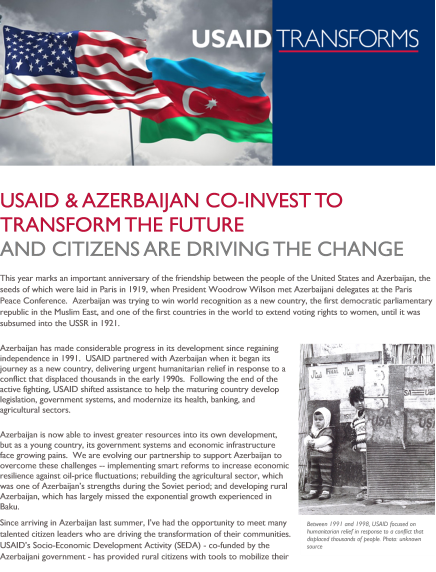Speeches Shim
USAID & Azerbaijan Co-Invest to Transform the Future and Citizens Are Driving the Change
This year marks an important anniversary of the friendship between the people of the United States and Azerbaijan, the seeds of which were laid in Paris in 1919, when President Woodrow Wilson met Azerbaijani delegates at the Paris Peace Conference. Azerbaijan was trying to win world recognition as a new country, the first democratic parliamentary republic in the Muslim East, and one of the first countries in the world to extend voting rights to women, until it was subsumed into the USSR in 1921.
Azerbaijan has made considerable progress in its development since regaining independence in 1991. USAID partnered with Azerbaijan when it began its journey as a new country, delivering urgent humanitarian relief in response to a conflict that displaced thousands in the early 1990s. Following the end of the active fighting, USAID shifted assistance to help the maturing country develop legislation, government systems, and modernize its health, banking, and agricultural sectors.
Azerbaijan is now able to invest greater resources into its own development, but as a young country, its government systems and economic infrastructure face growing pains. We are evolving our partnership to support Azerbaijan to overcome these challenges -- implementing smart reforms to increase economic resilience against oil-price fluctuations; rebuilding the agricultural sector, which was one of Azerbaijan’s strengths during the Soviet period; and developing rural Azerbaijan, which has largely missed the exponential growth experienced in Baku.
Since arriving in Azerbaijan last summer, I’ve had the opportunity to meet many talented citizen leaders who are driving the transformation of their communities. USAID’s Socio-Economic Development Activity (SEDA) - co-funded by the Azerbaijani government - has provided rural citizens with tools to mobilize their communities to improve local livelihoods. Through SEDA, engaged citizens across Azerbaijan have raised $670,000 to complete 125 projects that include activities supporting local economies, medical facilities, roads in rural areas, water and irrigation systems, and local school renovations -- benefiting 215,000 people in 150 communities. Many of these communities have used this process to organically develop follow-on projects on their own to tackle other community problems.
I’ve also met farmers and owners of small and medium-sized agribusinesses who are accelerating the growth of Azerbaijan’s agricultural sector one apple, berry, pomegranate and nut business at a time. Since 2014, USAID’s $9.7 million investment in technical assistance to private agribusinesses through the Agricultural Support to Azerbaijan Project (ASAP) has increased export revenues by nearly $66 million -- a 700 percent return on investment. These businesses are leading Azerbaijan’s efforts to expand and diversify the non-oil economy.
In October, I met the manager of a hazelnut factory in northern Azerbaijan who showed me how ASAP had helped him invest in the equipment he needed to export hazelnuts. USAID linked his factory and other producers and exporters with new foreign buyers to build economic resilience to unstable regional markets. Today, 70 percent of hazelnut exports go to profitable European markets versus 30 percent before USAID’s assistance. USAID also worked with hazelnut farmers and producers to establish Azerbaijan’s first hazelnut association - a non-governmental platform where farmers can advocate for change that’s good for business. Their efforts have already simplified export procedures for hazelnuts, paving the way for future growth.
I have traveled twice to the southern region of Masalli, a religiously conservative area near the border with Iran, where I met women entrepreneurs who challenge gender stereotypes and conservative ideologies by becoming business leaders. With support from USAID, United Nations Development Program, and Azerbaijan’s State Committee of Family, Women and Children’s Affairs, over 50 rural women have opened small businesses.
USAID/Azerbaijan is now working with Azerbaijan on creating the private sector synergies that will lead the next stage of Azerbaijan’s development. In April, USAID is teaming up with American Chamber of Commerce in Azerbaijan and the United States-Azerbaijan Chamber of Commerce to host the first ever U.S-Azerbaijan Agricultural Forum in Chicago, Illinois. This event will bring together government officials, farmers and agribusinesses from both countries to form strategic partnerships. The demands of Azerbaijan’s rapidly developing agricultural sector can be met by the American private sector -- good business for both countries.
Every day I am inspired by the Azerbaijani citizens who I’ve met -- women and men, young and old -- who have invested their time and energy and used their innovations to transform communities and revitalize local economies. I have been equally inspired by the Azerbaijani government’s initiatives to increase economic security by investing in reforms to diversify the economy and promote the rise of family and women-owned small businesses. I see USAID’s role here as a catalyzing force, one that is able to use its unique position as one of the world’s premier development agencies to bring together government, the innovation and resources of the private sector, and the energy of Azerbaijan’s young population to co-invest in the future.
As we move forward, we are working with Azerbaijan to ensure that our countries’ co-investment continues to incentivize the private sector and energize ordinary citizens to tackle the challenges ahead and lay the groundwork for a long and prosperous partnership between our two countries that supports Azerbaijan’s economic independence.
Jaidev Singh, PhD
Mission Director, USAID/Azerbaijan


Comment
Make a general inquiry or suggest an improvement.